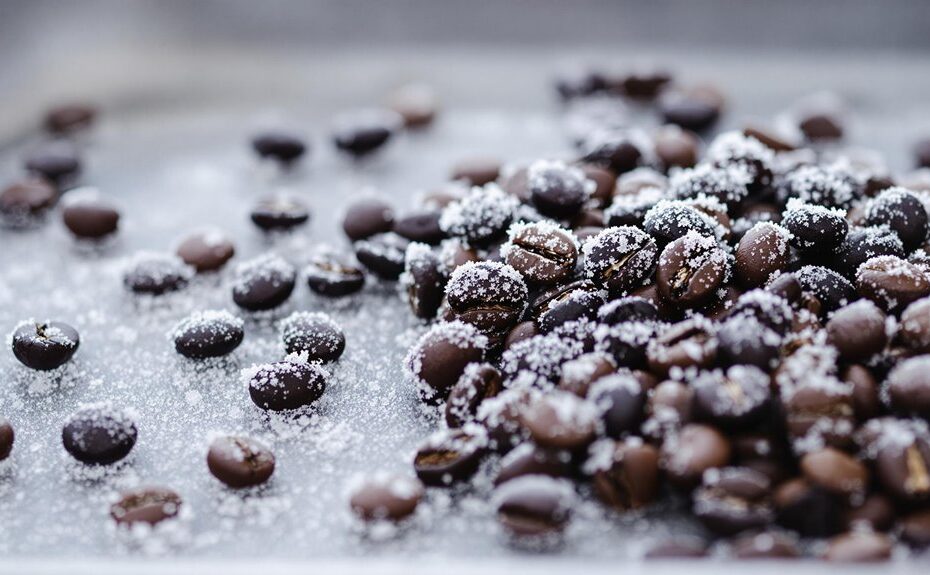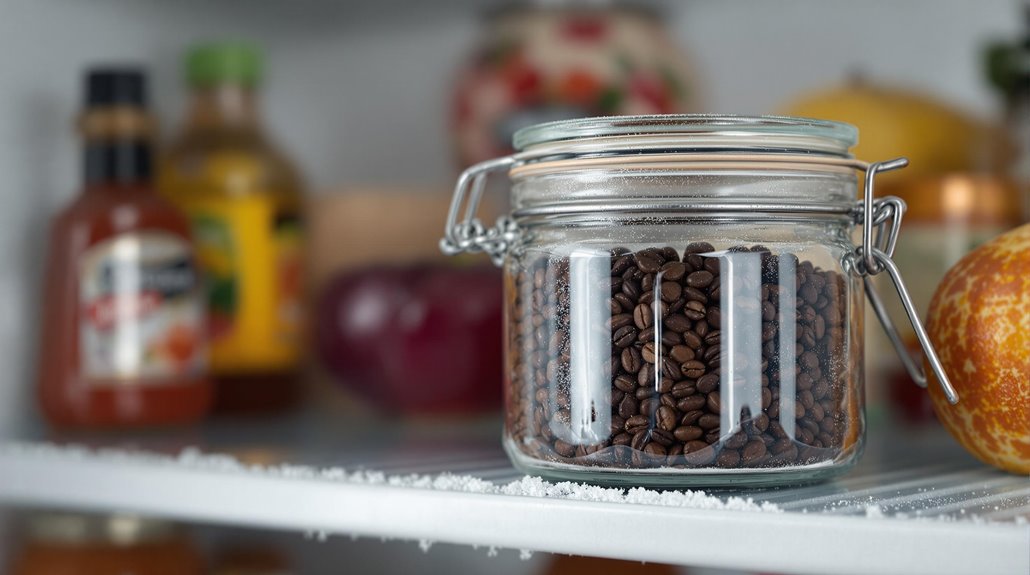







Imagine your favorite coffee beans as a ticking clock, their flavors slowly fading with each passing day. Freezing them might seem like hitting the pause button, but is it really that simple? While freezing can preserve freshness, it's not a one-size-fits-all solution—improper storage can lead to moisture damage or flavor loss. You'll need to weigh the benefits against potential pitfalls, like how freezing affects grind consistency or aroma. The key lies in understanding the science and technique behind it. So, can you freeze coffee beans without sacrificing quality? The answer might surprise you.
Key Takeaways
- Freezing coffee beans at -18°C (0°F) preserves freshness and extends shelf life up to 2-3 months, with flavor retention up to 6 months.
- Use airtight, vacuum-sealed containers to prevent moisture, odor contamination, and freezer burn, ensuring optimal preservation.
- Divide beans into single-use portions to avoid repeated thawing and refreezing, which can degrade flavor and texture.
- Thaw beans to room temperature before grinding to prevent condensation and ensure even extraction for the best flavor.
- Freezing is ideal for bulk, specialty, or seasonal beans but not recommended for low-grade or stale grocery store coffee.
The Science Behind Freezing Coffee Beans
Freezing coffee beans can effectively preserve their freshness by slowing down oxidation and protecting volatile aromatic compounds. When you freeze coffee beans at -18°C (0°F), the low temperature markedly reduces the rate of chemical reactions, including oxidation, which degrades flavor over time. This process also safeguards the delicate aromatic compounds responsible for the beans' nuanced flavors. Lightly roasted beans, with their denser structure, tend to retain freshness longer in the freezer compared to dark roasts, which are more porous and prone to flavor loss.
To maximize freshness, you must store the beans in a vacuum-sealed or airtight container. This prevents moisture and external odors from compromising the beans' integrity. Freezing also minimizes exposure to light, heat, and air—three primary factors that accelerate coffee degradation. However, when you're ready to use the beans, let them thaw to room temperature before grinding. Skipping this step can lead to condensation, which affects grind consistency and overall flavor extraction. By understanding these scientific principles, you can extend the shelf life of your coffee beans without sacrificing quality.
Pros and Cons of Freezing Coffee Beans
Freezing coffee beans preserves freshness longer by slowing oxidation and retaining volatile aromatic compounds, extending shelf life up to 2-3 months. However, improper freezing exposes beans to moisture damage, condensation, and freezer odors, which can degrade flavor. When done correctly, freezing enhances flavor retention for specialty or bulk coffee, but it's less suitable for daily use or low-quality beans.
Preserves Freshness Longer
One effective method to extend the freshness of coffee beans is by freezing them, which slows oxidation and preserves volatile aromatic compounds for up to 2-3 months. Freezing coffee beans in an airtight container minimizes exposure to air, preventing the degradation of essential oils and maintaining fresh coffee characteristics. This method is particularly beneficial for preserving peak flavor in bulk or specialty beans, as it halts the natural aging process that occurs at room temperature. When stored correctly, frozen beans retain their quality better than those kept in standard storage conditions. However, improper freezing, such as using non-airtight containers or frequent thawing, can lead to freezer burn and flavor loss. To avoid this, divide your beans into single-use portions and seal them tightly before freezing. Thaw the beans to room temperature before grinding to prevent condensation, which can compromise flavor. By following these steps, you'll preserve freshness and guarantee your coffee maintains its intended profile for months.
Risk of Moisture Damage
While freezing coffee beans can effectively preserve freshness, it also introduces the risk of moisture damage, which can compromise flavor and aroma. When you freeze coffee beans, moisture from the freezer air can seep into improperly sealed packaging, leading to condensation during thawing. This moisture absorption accelerates staleness and can even promote mold growth, resulting in significant flavor degradation. To mitigate this risk, always store your beans in airtight containers or vacuum-sealed bags, which minimize exposure to humidity and prevent moisture damage. Repeated freezing and thawing exacerbates the problem, as each cycle increases the likelihood of moisture infiltration. For best possible results, divide your beans into small, single-use portions before freezing. This approach limits their exposure to air and humidity, reducing the chance of moisture-related issues. By taking these precautions, you can preserve the integrity of your coffee beans and avoid the pitfalls of flavor degradation caused by improper freezing practices.
Flavor Retention Benefits
Preserving the nuanced flavors of coffee beans through freezing can offer significant benefits, particularly when done correctly. Freezing slows oxidation, a primary cause of flavor degradation, by stabilizing the aromatic compounds that define coffee's freshness. When stored in airtight, moisture-proof containers, frozen coffee beans can retain their flavor profile for up to 2-3 months. Lightly roasted beans, with their denser structure, are particularly well-suited for freezing, as they resist flavor loss better than dark roasts. However, improper freezing—such as exposing beans to moisture or freezer odors—can compromise flavor retention, leading to off-flavors. After thawing, frozen beans maintain ideal freshness for about 5-6 days, though they may lose peak flavor faster than non-frozen beans. Freezing is most effective for high-quality, freshly roasted beans, as it cannot enhance the flavor of low-grade or stale coffee. By minimizing exposure to air and temperature fluctuations, freezing helps preserve the delicate aromatic compounds that contribute to a rich, complex cup. When executed properly, freezing can be a practical method to extend the shelf life of your coffee beans without sacrificing their inherent flavors.
Best Practices for Freezing Coffee Beans
To freeze coffee beans effectively, start by storing them in airtight, vacuum-sealed containers or bags to minimize exposure to moisture and odors. Use small portions for freezing, dividing the beans into single-use quantities to avoid repeated thawing and refreezing, which can degrade flavor and aroma. Label each container with the roast date and freezing date to track freshness and guarantee timely use. When ready to brew, thaw the beans to room temperature before grinding to prevent condensation, which can lead to uneven grind size and affect extraction. Freezing is most effective for high-quality, freshly roasted beans intended for storage beyond 2-3 weeks, as it slows oxidation and preserves volatile compounds responsible for flavor. Avoid freezing beans that are already stale, as the process won't restore lost freshness. By following these practices, you can maintain the integrity of your coffee beans and enjoy a consistent, high-quality brew.
Common Mistakes When Freezing Coffee Beans
Using non-airtight containers for freezing coffee beans allows moisture to seep in, degrading their flavor and aroma. Repeatedly thawing and refreezing beans introduces condensation, which compromises their structural integrity and taste. Neglecting to seal beans properly exposes them to air, accelerating oxidation and reducing their shelf life.
Improper Container Usage
Improper container usage is a critical misstep that can ruin the quality of your frozen coffee beans. When storing coffee beans in the freezer, you must use airtight, resealable bags or vacuum-sealed containers to prevent moisture, odors, and air from compromising the beans. Non-airtight containers allow humidity and freezer odors to infiltrate, leading to flavor degradation and freezer burn. Avoid freezing coffee beans in their original, unsealed bags, as these fail to provide adequate protection against air exposure, accelerating staleness. Transparent or flimsy containers are equally problematic, as they don't block light or insulate against temperature fluctuations, which can degrade the beans' freshness and aroma. Additionally, when you freeze beans in large batches without portioning, you risk repeated thawing and refreezing, which damages their flavor profile. Opt for smaller, resealable bags to store individual portions, ensuring minimal air exposure and maintaining quality. Containers without vacuum-sealing capabilities allow oxygen to oxidize the beans, reducing their shelf life and overall quality. Proper container selection is essential to preserve the integrity of your coffee beans during freezing.
Frequent Thawing and Refreezing
Frequent thawing and refreezing of coffee beans introduces moisture through condensation, which compromises their flavor and freshness. Each freeze-thaw cycle accelerates oxidation, breaking down the aromatic compounds that define coffee freshness. Repeated temperature fluctuations also increase the risk of freezer burn, which alters the beans' texture and taste, leaving them stale and less flavorful. When you freeze coffee beans, the cellular structure becomes vulnerable to damage, and thawing and refreezing exacerbates this issue. This disruption leads to uneven grinding, as the beans lose their structural integrity, resulting in inconsistent particle size and poor extraction during brewing. To preserve coffee freshness, avoid multiple freeze-thaw cycles by portioning beans into single-use quantities before freezing. This minimizes exposure to air and temperature changes, ensuring the beans retain their quality. By limiting the number of times you freeze coffee beans, you reduce the risk of moisture absorption, freezer burn, and uneven grinding, maintaining the integrity of your coffee's flavor profile. Proper handling during freezing and thawing is critical to preserving the sensory qualities of your beans.
Neglecting Airtight Sealing
Airtight sealing is a critical factor in preserving the quality of frozen coffee beans. When you freeze your coffee beans without proper sealing, moisture and odors from the freezer infiltrate the container, leading to flavor degradation and freezer burn. Coffee beans absorb humidity, which strips them of essential oils and aromatic compounds, resulting in stale coffee beans. Exposure to air during freezing accelerates oxidation, breaking down the beans' flavor and freshness over time, even if you store your coffee beans in the freezer. Improper sealing also causes ice crystals to form, altering the beans' texture and negatively impacting grind consistency. To guarantee your coffee beans last and stay fresh, avoid using non-airtight containers or leaving original bags unsealed. Instead, opt for vacuum-sealed bags or airtight containers designed for freezing. This prevents moisture, odors, and air from compromising the beans' quality. Proper airtight sealing is essential to maintain the integrity of your coffee beans, guaranteeing they retain their flavor and freshness throughout their time in the freezer.
How Freezing Affects Coffee Flavor
Freezing coffee beans can substantially impact their flavor, both positively and negatively, depending on how it's done. When stored properly, freezing preserves volatile aromatic compounds, maintaining the beans' flavor for up to 2-3 months. This is because low temperatures slow the degradation of these compounds, which are critical for the beans' aroma and taste. However, improper freezing can lead to flavor degradation. If coffee beans aren't sealed airtight, they absorb moisture from the freezer, which dilutes their flavor and can introduce off-notes. Additionally, exposure to freezer odors can taint the beans' natural profile.
Thawing is another critical factor. If you grind frozen beans without thawing, condensation forms, leading to uneven extraction and a muted flavor. To avoid this, let the beans reach room temperature before grinding. Lightly roasted beans freeze better than dark roasts due to their denser structure and lower oil content, which minimizes the risk of flavor loss. By understanding these dynamics, you can optimize freezing to preserve the beans' flavor and aromatic compounds effectively.
Optimal Storage Alternatives to Freezing
To preserve the quality of your coffee beans without freezing, proper storage at room temperature is key. Freshly-roasted coffee beans are best stored in airtight, light-proof containers to maintain their flavor and aroma. Keep them in a cool, dark place, such as a pantry or cupboard, where temperatures range between 60-75°F (15-24°C). This environment helps keep them fresh for 2-4 weeks by minimizing exposure to heat, light, and moisture, which can degrade their quality.
For ideal coffee storage, use vacuum-sealed containers or one-way valve bags. These tools reduce oxygen exposure, extending freshness up to 5 weeks. Avoid storing coffee in the refrigerator or freezer, as humidity and odor absorption can compromise flavor. Instead, focus on maintaining a stable, room-temperature environment.
Grind your coffee beans just before brewing to maximize freshness. Pre-ground coffee loses its aroma and flavor faster due to increased surface area exposed to air. By following these guidelines, you'll guarantee your coffee stays good and retains its complex flavors without the need for freezing.
When Freezing Coffee Beans Makes Sense
While storing coffee beans at room temperature is ideal for short-term freshness, there are situations where freezing becomes a viable option. Freezing your coffee beans makes sense when you have excess coffee that you can't consume within 2-3 weeks, as it helps preserve their freshness for later use. This method is particularly beneficial for high-dollar or rare specialty coffee beans, allowing you to extend their enjoyment over several months. If you've invested in freshly roasted, high-quality beans and want to savor their flavor over time, freezing is an effective way to maintain their integrity. It's also a practical solution for coffee enthusiasts who stock up on seasonal or limited-edition beans, ensuring they don't lose quality before you can enjoy them. However, freezing is not recommended for low-grade or stale grocery store coffee, as it cannot improve poor-quality beans. By freezing your coffee beans to keep them fresh, you can maximize the lifespan of premium or specialty coffee while maintaining their complex flavors and aromas.
Step-by-Step Guide to Freezing Coffee Beans
If you've decided to freeze your coffee beans to preserve their freshness, it's essential to follow a methodical approach to guarantee their quality remains intact. Start by selecting fresh, high-quality whole beans and dividing them into small batches, ideally single-use portions. This minimizes air exposure and prevents the need for repeated thawing, which can degrade flavor. Use airtight containers or vacuum-sealed bags to store the beans, making certain no air or moisture can infiltrate and compromise their integrity. Label each container or bag with the roast date and freezing date to track freshness and make sure of timely use. Place the sealed containers in the coldest part of your freezer, maintaining a constant temperature of 0°F (-18°C) for ideal preservation. When ready to use, thaw the beans at room temperature before grinding to avoid condensation, which can negatively impact flavor. By following these steps—freeze in small portions, use airtight containers or vacuum seal, and store whole beans—you'll maintain the best way to store coffee beans for extended freshness.
How Long Frozen Coffee Beans Stay Fresh
Frozen coffee beans can maintain their freshness for up to 2-3 months when stored in airtight, vacuum-sealed containers at a consistent temperature of -18°C (0°F). This method of storing coffee prevents moisture and air from degrading the beans, keeping them fresh for longer compared to room-temperature storage. For the best results, place the frozen coffee in the coldest part of your freezer to reduce temperature fluctuations, which can cause condensation and accelerate staleness. While frozen coffee beans can retain their flavor and aroma for up to 6 months, their peak freshness is ideal within the first 2-3 months. Labeling the containers with the freezing date helps you track their freshness and guarantees you use them within this window. If you only need a small amount, portion the beans before freezing to avoid repeated thawing and refreezing, which can compromise quality. Properly stored frozen coffee beans extend their shelf life considerably, but after 6 months, flavor degradation becomes noticeable. By following these guidelines, you can enjoy fresher coffee for longer periods.
Disclosure: As an Amazon Associate, I earn from qualifying purchases.







